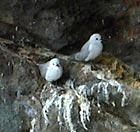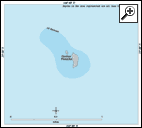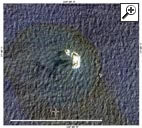
Gardner Pinnacles
(Pūhāhonu)
 When the two pinnacles of volcanic rock between French Frigate Shoals and Maro Reef come into view, mariners know they have reached Gardner Pinnacles. This 5-acre island comprises the smallest land area of any of the Northwestern Hawaiian Islands (NWHI). Underwater shelves reach outward from the pinnacles and extend over an area of 2,446 square kilometers (604,000 acres).
When the two pinnacles of volcanic rock between French Frigate Shoals and Maro Reef come into view, mariners know they have reached Gardner Pinnacles. This 5-acre island comprises the smallest land area of any of the Northwestern Hawaiian Islands (NWHI). Underwater shelves reach outward from the pinnacles and extend over an area of 2,446 square kilometers (604,000 acres).
In 1820, Captain Joseph Allen of the Nantucket whaler, Maro, reported seeing "a new island or rock not laid down on any of our charts. . . . It has two detached humps. . . . We call it Gardner's Island."
Gardner Pinnacles, or Pūhāhonu, Hawaiian for “turtle surfacing for air,” is a long-extinct shield volcano—a broad dome that rises about 4,500 meters from the sea floor from a single source of molten rock. In 2020, researchers reported that Pūhāhonu contains 150,000 cubic kilometers of rock, making it the biggest volcano by volume in the world.
 Gardner Pinnacles is known for its abundance of giant opihi, the endemic Hawaiian limpet. The islands' rocky inter-tidal areas are an ideal habitat for opihi. Twenty-seven documented species of stony coral are distributed throughout the pinnacles' reef system. Acropora table corals have been noted on the leeward side, while tube, stony, and soft corals have been found throughout the reef.
Gardner Pinnacles is known for its abundance of giant opihi, the endemic Hawaiian limpet. The islands' rocky inter-tidal areas are an ideal habitat for opihi. Twenty-seven documented species of stony coral are distributed throughout the pinnacles' reef system. Acropora table corals have been noted on the leeward side, while tube, stony, and soft corals have been found throughout the reef.
 The underwater shelves around Gardner Pinnacles provide habitat for some of the highest recorded numbers of fish species in the Northwest Hawaiian Islands. It is interesting to note that the number of coral species found at Gardner is nearly twice that found at the similar basalt islands of Nihoa and Mokumanamana. Also, many main Hawaiian fish species not found at other NWHI areas are found here.
The underwater shelves around Gardner Pinnacles provide habitat for some of the highest recorded numbers of fish species in the Northwest Hawaiian Islands. It is interesting to note that the number of coral species found at Gardner is nearly twice that found at the similar basalt islands of Nihoa and Mokumanamana. Also, many main Hawaiian fish species not found at other NWHI areas are found here.
Gardner Pinnacles is home to seabirds, insects, and only one species of plant, the succulent sea purslane. Scientists have observed 19 species of seabirds, 12 of which breed on the steep cliffs, including the rare blue gray noddy.
 Despite its small size and isolation, the island has a surprisingly wide array of insects. Spiders, mites, moths, centipedes, flies, beetles, isopods and earwigs, among others, are found on Gardner Pinnacles. Recently a researcher visiting the island found what he believes are two new species of spiders. He also found a third spider previously not known from Gardner Pinnacles.
Despite its small size and isolation, the island has a surprisingly wide array of insects. Spiders, mites, moths, centipedes, flies, beetles, isopods and earwigs, among others, are found on Gardner Pinnacles. Recently a researcher visiting the island found what he believes are two new species of spiders. He also found a third spider previously not known from Gardner Pinnacles.


